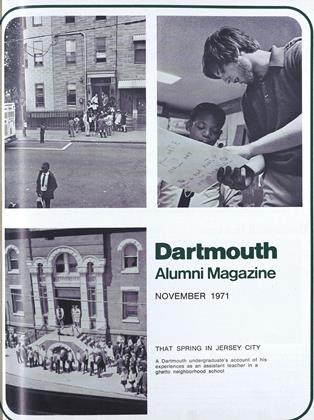By DelorisHarrison (Pen name for Visiting AssistantProfessor of English, Mrs. Deloris Netzband). New York: The Dial Press, 1971.120 pp. $4.95.
Deloris Harrison has written a short novel in a most unlikely mode, considering the subject matter: a black girl grows up in the Harlem ghetto. Anyone who has kept abreast of modern fiction knows what to expect of such minority materials: violence, drugs, crime, hatred. Her book, astonishingly, is a lyric, appealing, low-key story of a nice girl.
As I read this novel, I was reminded of the tender, sad story of Anne Frank, which is also a family story, a first-love story, told in a quiet tone. Journey All Alone is the story of a good daughter, good to her mother and brother, and, in a more troubled way, good daughter to a father with an itchy foot and a dream of fame as a jazz pianist. He leaves after a fight with the mother, but he turns up again and again for more fights and more torment for the daughter who loves him.
At high school she ras three girl friends, but no boy friends, and no teacher who takes an interest in her. One black boy likes her, and he is the smartest boy in the class, but he is fat and wears thick glasses. She might like Gene, but her girl friends scorn him, and their opinions count heavily.
So, her life is home and school, the beach now and then; visits with Aunt Vi, plump and good fun, who defends the absent father; studying and talking with her girl friends.
Then one day, walking through the park near the tennis courts, she sees Angel, a tall, handsome Puerto Rican boy, and the dream begins. She is in love, hopeless, adoring, distant. "Mama, am I pretty?" she asks. "'Course you pretty," her mother answers automatically, not looking at her. Mildred knows she will never meet Angel. Then Diane, one of the girl friends, is going to have a party, and Angel might be there. First come the problems of a new dress and a hair-do, with scant money. But these finally overcome, she goes to the party. The only one who pays attention to her is fat Gene, he of the thick glasses and awkward manner. He likes her; she likes him, but for her it has the feeling of two pariahs for mutual support.
Angel is there, stoned out of his mind, a squalid parody of a prince. To add to the collapse of her dream, he makes a vulgar pass at Diane.
So her dream turns to shoddy. Feeling desolate, walking alone through the park next day, she is dragged into the bushes and criminally assaulted by two thugs.
She finds her way to Aunt Vi, and is comforted and cared for gently, but her youth is over. Through her mind runs the old spiritual which ends, "You gotta make this journey all alone."
Miss Harrison, whose short stories have gained distinguished notice in Best ShortStories, has written a most promising and delightful first novel.
A Rackham Fellow, Fulbright Lecturer inSouth Africa, and winner of the HopwoodAward, Professor Haugh at the University ofMichigan teaches American literature, modern fiction, and creative writing. He haspublished works on Conrad, Hawthorne, andFaulkner.
 View Full Issue
View Full Issue
More From This Issue
-
 Feature
FeatureThat Spring in Jersey City
November 1971 By BRUCE ALAN KIMBALL '73 -
 Feature
FeatureThe View from Oxford
November 1971 By Sanford B. Ferguson '70 -
 Feature
FeatureThe President's Convocation Address
November 1971 -
 Feature
FeatureEngineering in the Limelight
November 1971 -
 Article
ArticleBig Green Teams
November 1971 By JACK DEGANGH -
 Article
ArticleFaculty
November 1971 By ROBERT B. GRAHAM '40
Books
-
 Books
BooksPAINTBRUSH, A JOURNAL OF POETRY, TRANSLATIONS, & LETTERS, Spring 1974
October 1974 By CLAUDE G. LIMAN '65 -
 Books
BooksTHE COMPLEAT BROWN TROUT.
June 1974 By DANA S. LAMB '21 -
 Books
BooksBOXCAR IN THE SAND.
April 1957 By GEORGE F. THERIAULT '33 -
 Books
BooksPRINCIPLES OF GEO CHEMICAL PROSPECTING.
November 1957 By JOHN B. LYONS -
 Books
BooksALUMNI PUBLICATIONS
April 1921 By K.A.R. -
 Books
BooksTied for Second
June 1981 By Noet Perrin


